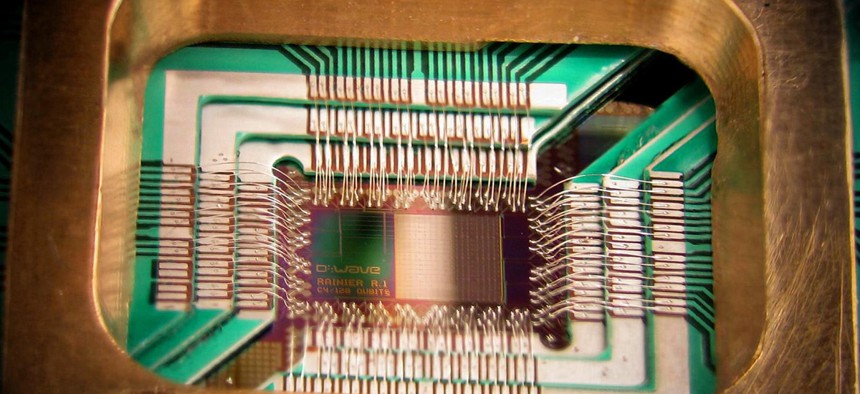Quantum Company D-Wave Takes A Bet on Federal Buyers

A chip constructed by D-Wave Systems Inc., designed to operate as a 128-qubit superconducting adiabatic quantum optimization processor, mounted in a sample holder. Wikipedia Commons
The Canadian company launched a government-focused subsidiary.
A company that sells quantum computing processors is taking a bet that government customers could drive sales.
Canadian company D-Wave, which sells multimillion-dollar units to groups for research, is launching a government-focused subsidiary called D-Wave Government Inc., the company announced Tuesday.
Last year, the Los Alamos National Security Laboratory was the first federal entity to buy a D-Wave processor; that lab focuses on monitoring nuclear stockpiles. D-Wave has also installed a unit at NASA's Ames Research Center as part of a collaboration with Google on artificial intelligence.
» Get the best federal technology news and ideas delivered right to your inbox. Sign up here.
Quantum computing uses atomic particles called qubits to store information, instead of the ones and zeros of classical computing. There is debate about whether current quantum systems can be called "quantum computers," because they are used mostly for research and aren't yet sophisticated enough to run off-the-shelf applications, but D-Wave says it's the only company that sells these units commercially.
D-Wave Government Inc.'s board will include members from the Energy and Defense departments, the National Science Board and the intelligence community.
After selling to Los Alamos last year, D-Wave President Bo Ewald told Nextgov the bulk of U.S. customers would likely be national laboratories, universities and defense entities. Commercial businesses are less likely to invest in research, he said.
"They need to be able to make money, and that requires more software tools and applications," Ewald added.
And conventional computers may soon "reach their limits in terms of scaling and performance per watt," so researchers must "investigate new technologies to support our mission,” Mark Anderson, a technologist at Los Alamos' Weapons Physics Directorate, said in a statement about the D-Wave deal last year.





